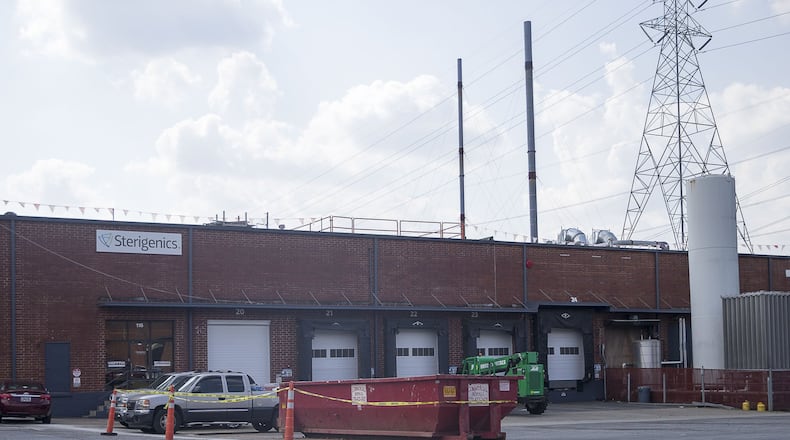A controversial medical sterilization company is accusing Cobb County of unlawfully lowering property values of thousands of homes around its plant.
Sterigenics has filed a lawsuit against the Board of Tax Assessors, claiming it targeted the company with its actions without proper data to back up its decision. The board in April approved a 10% reduction on residential property valuations within a two-mile radius of the facility, said Chief Appraiser Stephen White. The reduction affects more than 5,000 homes.
White told the AJC earlier this month that the Board approved the reduction because it “recognizes that there is an environmental air-quality concern surrounding the Sterigenics plant.”
He also said the board believes that since the area within the radius has experienced “limited sales and listing activity,” it is difficult to determine the effect Sterigenics’ operations has had on property values. The Board of Tax Assessors will review the area again for the 2021 tax year.
In the suit filed Aug. 14 in the U.S. District Court for the Northern District of Georgia, Sterigenics claims the board’s actions has led to the company facing public scorn, and will cause the company to suffer damage to its reputation and economic harm.
The company said through a spokesman that the board’s decision was in violation of Georgia’s laws governing property tax valuations.
“Their unfounded action was taken without supporting data and despite Georgia EPD’s confirmation that the facility is in full compliance with all state and federal air regulations,” the spokesman said in a written statement. “The fact is that the Sterigenics facility is safe and not causing anyone harm.”
White directed all requests for comment on Friday to board attorney Scott Gregory. Gregory did not immediately return The Atlanta Journal-Constitution’s call for comment.
Sterigenics’ use of ethylene oxide has come under scrutiny after a July 2019 story by WebMD and Georgia Health News reported potential increased cancer risks for residents in neighborhoods surrounding the plant, which is located on Plant Atkinson Road near Smyrna.
Janet Rau, president of Stop Sterigenics-Georgia, said she and other residents who live in within the two-mile radius of the plant have been critical of the company’s lawsuit.
Stop Sterigenics-Georgia formed amid the fallout from the WebMD article and have called on Gov. Brian Kemp to close the plant. Rau said Sterigenics didn’t start making changes to its operations “until we got loud about it.”
“I don’t think they recognize any potential damage they do through their actions,” she said. “They do everything begrudgingly.”
Stop Sterigenics-Georgia is organizing a virtual forum made up of attorneys who will talk about what options are available. No date for the forum has been finalized, Rau said.
At least one law firm has clients who are considering filing a lawsuit against Sterigenics due to the devaluation of their homes.
“Most of our clients’ homes are the largest and most important asset they have, and it is disheartening to see these innocent people lose value to something they have been investing in for many years,” attorney Eric Hertz said in a written statement to the AJC on Friday.
The firm in May filed a lawsuit against Sterigenics and ConMed Corporation, which a medical equipment distribution center in Lithia Springs, alleging more than 50 warehouse employees were exposed to unsafe levels of ethylene oxide for over a decade.
Following the WebMD report, residents attended town hall meetings and protests to call for Sterigenics’ closure, and some cancer survivors wondered if their long-term exposure to ethylene oxide factored into their illnesses.
Stergenics argues on its website that ethylene oxide is a naturally-occurring gas that’s produced by the human body, plants, exhaust from vehicles, agriculture chemicals and gas grills, and it’s needed for the only method of satisfying “FDA-approved sterility validations for many critical medical devices.”
Amid public outcry and protests, Sterigenics suspended operations last summer to install new pollution controls. Cobb County later kept the plant closed, alleging that it was out of compliance with its fire codes.
To help fight the shortage of medical equipment due to the COVID-19 pandemic, County Chairman Mike Boyce in March signed an emergency declaration to allow the company to resume sterilization activity on a limited basis. Sterigenics then filed a lawsuit against the county on the basis that Cobb didn’t have the authority to keep the plant closed.
A judge issued a temporary restraining order against the county and granted Sterigenics’ request to resume full operations. A consent order signed in April allowed the company to continue its operations indefinitely while its lawsuit filed against the county moves through the court system.
About the Author
Keep Reading
The Latest
Featured



